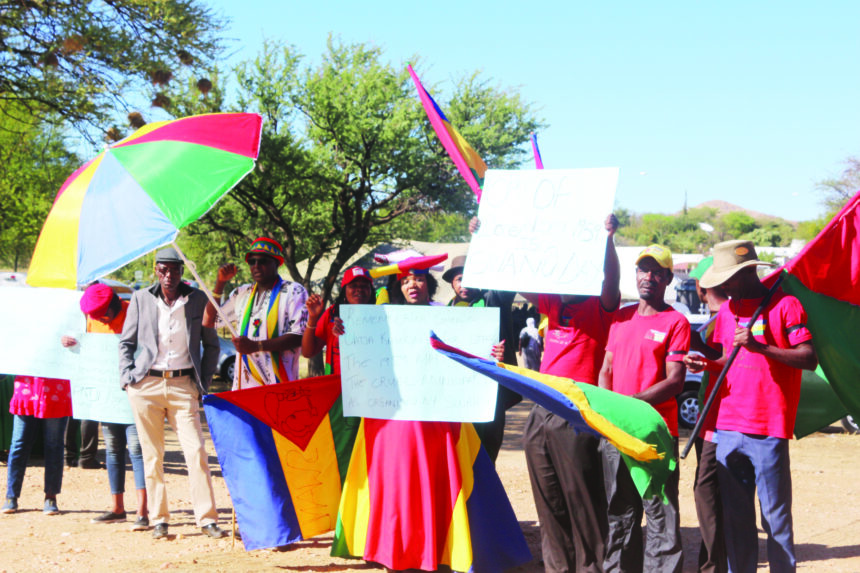Lahja Nashuuta
With the Presidential and National Assembly elections fast approaching, the dust of factionalism is refusing to settle within one of Namibia’s oldest political parties, Swanu.
The faction led by Evilastus Kaaronda on Saturday launched the party’s manifesto during the Omaheke regional conference in Gobabis.
Meanwhile, Windhoek’s 8ste Laan branch, which is said to represent the party’s stronghold, held its extraordinary congress and central committee meeting on Saturday at Shalom Centre to elect new leadership. This faction is alleged to be in favour of Charles Katjivirue.
All this took place despite the Windhoek High Court on 17 June ordering the two factions to meet and hold an extraordinary central committee meeting.
Court challenge
In September 2021, Swanu, with the assistance of local lawyer Edwin Coetzee, approached the court, seeking an order to stop Katjivirue and his counterparts from their “unlawful conduct” of utilising the party’s letterhead, emblems and colours in their misinformation campaigns against the party.
They should also be restrained from holding themselves as elected office bearers of Swanu and may not evict the party from its offices situated on Rama Street, Katutura, Windhoek.
At the time, the party claimed Katjivirue and his fellow party members convened a national congress and elected themselves as leaders of the party, contravening Swanu’s constitution. They also threatened to take over the party’s offices and leadership.
In August 2021, a vote of no confidence in the party’s leadership headed by Tangeni Iijambo was passed. The faction voted Katjivirue as the new party president.
Last year, the two factions went for mediation and reached a settlement agreement which was made an order of court on 17 June 2023.
As per the court order, the extraordinary congress held on 21 August 2021 and all-branches meeting on 22 March 2021 were declared invalid.
Kaaronda and Katjivirue must meet before 19 June 2024 to agree on the preparations to call for an extraordinary central committee meeting.
However, on 23 August this year, Katjivirue took Kaaronda to court for allegedly violating the court order of 17 June 2023. This case will be heard on 27 September before Judge Orben Sibeya.
Kaaronda vs Katjivirue
In response, Kaaronda maintained that his congress was legitimate, and that all party structures were involved as per the constitution.
“The court order was clear that we need to call for the extraordinary congress, and that’s what we did. A congress was called, and we managed to come up with our parliamentary list,” he said.
Kaaronda labelled the extraordinary congress held at the Shalom Centre and its decisions as null and void, and in violation of the party constitution.
“How can a branch call for an extraordinary congress? As per our constitution, there are procedures to be followed when convening an extraordinary congress, hence what happened at the Shalom Centre cannot be considered as an extraordinary congress,” he stressed.
However, Katjivirue denied calling for the extraordinary congress, and distanced himself from it.
“The extraordinary congress was called by the branches in terms of the constitution. I was not involved in the organisation. I was only invited as an ordinary member,” he said.
He hit back, saying that the event in Gobabis is the one that is illegal.
“He does not have authority to produce and launch a manifesto when the extraordinary congress did not take place for members to be accorded the opportunity to elect the party leaders of their choice,” he said.
He added, “All we are saying is that Kaaronda has a lawsuit against him for contravening the court order, and that he will be summoned in two weeks. He must focus on that and not misinform the public that Swanu has launched its manifesto. We are yet to launch our manifesto.”
Analysts chime in
Political analyst Ndumba Kamwanyah cautioned Swanu leadership to desist from internal fights, stating that it might weaken the party’s cohesion and ability to present a united front in
elections.
Kamwanyah said the disunity can lead to a loss of confidence amongst supporters, reduced voter turnout, and difficulty in mobilising the party base. Additionally, internal strife can distract from campaign efforts and diminish the party’s appeal to undecided voters.
“In a competitive political landscape where, smaller parties already face challenges in gaining traction, internal discord could further marginalise Swanu, limiting its influence and potentially leading to poor electoral performance,” he noted.
He added, “If Swanu cannot resolve its internal issues and present a clear and cohesive message to voters, it risks being overshadowed by more unified and organised parties in the upcoming elections. And that could mean the party is finished on 27 November 2024.” Legal commentator Natji Tjirera also cautioned the party to desist from infightings ahead of the upcoming elections.
“Swanu seems hell-bent on ensuring that they do not return to Parliament. For a political party that has only one seat in Parliament to be fighting amongst themselves is unfortunate. What makes the matter worse is that the fight is not about principle and/or ideology,” he said.
He went on to say, “It’s a fight fuelled by egos, and seemingly a desire to be high on the list to Parliament, a desire that may backfire completely.”
-lnashuuta@gmail.com



